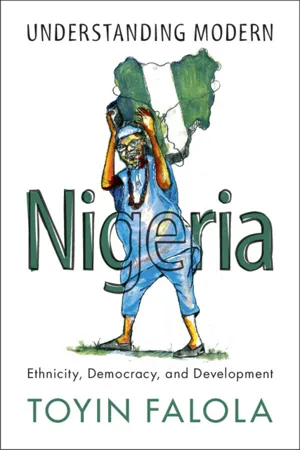
- English
- PDF
- Available on iOS & Android
About this book
Since its independence from Britain in 1960, Nigeria has emerged as Africa's second largest economy and one of the biggest producers of oil in the world. Despite its economic success, however, there are deep divisions among its two hundred and fifty ethnic groups. Centered around three of the dominant themes of Nigeria's post-colonial narrative - ethnicity, democracy and governance, this is an accessible and comprehensive introduction to the history and events that have shaped these three areas. World-renowned expert in Nigerian history, Toyin Falola shows us how the British laid the foundations of modern Nigeria, with colonialism breading competition for resources and power and the widening cleavages between the Hausa-Fulani, Yoruba, and Igbo ethnic groups that had been forced together under British rule, the choice of federalism as a political system, and the religious and political pluralism that have shaped its institutions and practices. Using an examination of the outcomes of this history, manifested in hunger, violence, poverty, human rights violations, threats of secession and corruption, where power and resources are used to reproduce underdevelopment, Falola offers insights and recommendations for the future of policy and the potential for intervention in the country.
Frequently asked questions
- Essential is ideal for learners and professionals who enjoy exploring a wide range of subjects. Access the Essential Library with 800,000+ trusted titles and best-sellers across business, personal growth, and the humanities. Includes unlimited reading time and Standard Read Aloud voice.
- Complete: Perfect for advanced learners and researchers needing full, unrestricted access. Unlock 1.4M+ books across hundreds of subjects, including academic and specialized titles. The Complete Plan also includes advanced features like Premium Read Aloud and Research Assistant.
Please note we cannot support devices running on iOS 13 and Android 7 or earlier. Learn more about using the app.
Information
Table of contents
- Cover
- Half-title page
- Title page
- Copyright page
- Dedication
- Contents
- List of Figures
- List of Maps
- Preface
- Acknowledgments
- Part I Introduction
- Part II Context and History
- Part III Democracy and Governance
- Part IV Development Crises
- Part V Reforms and Revolutions
- Part VI Conclusion
- Bibliography
- Index